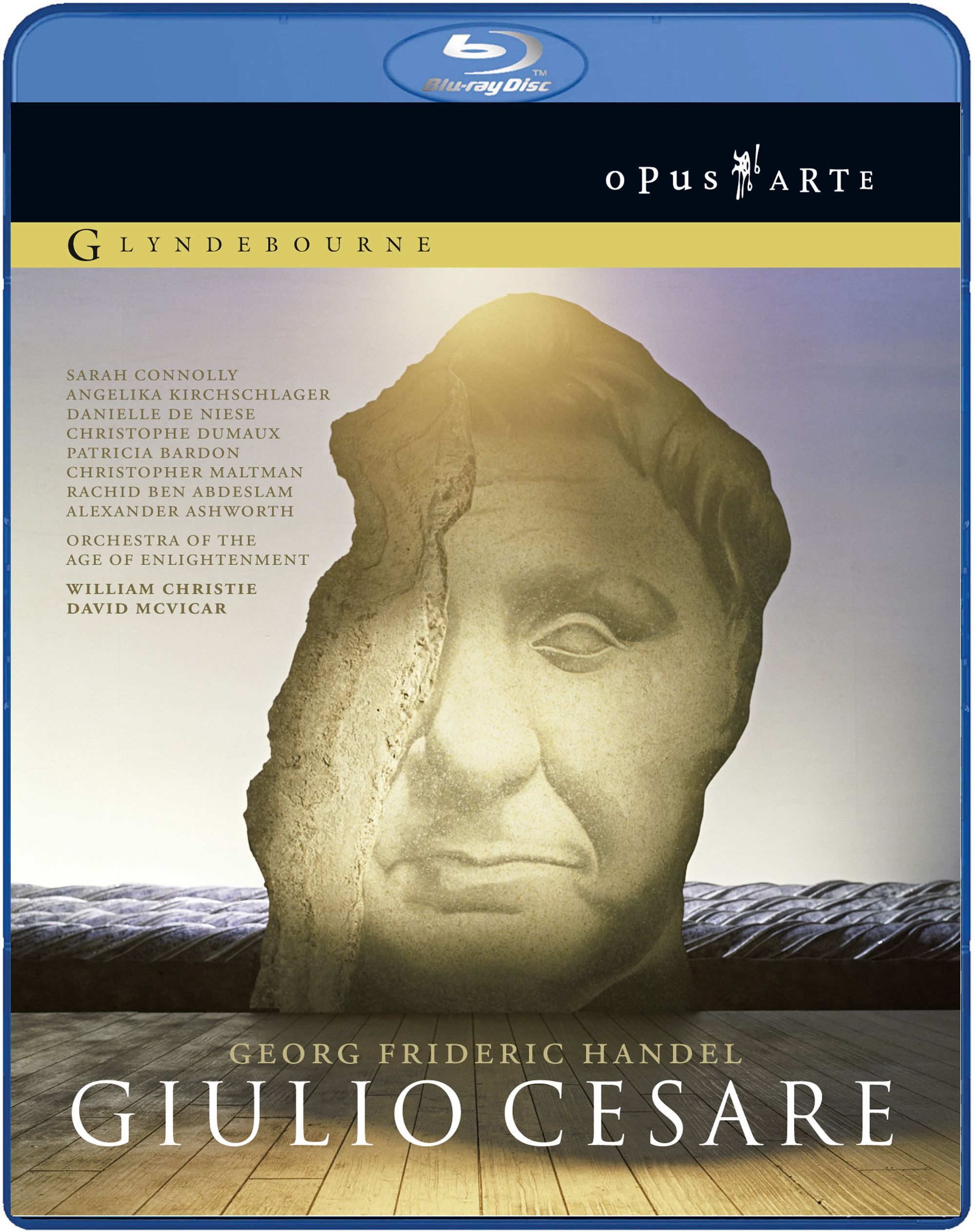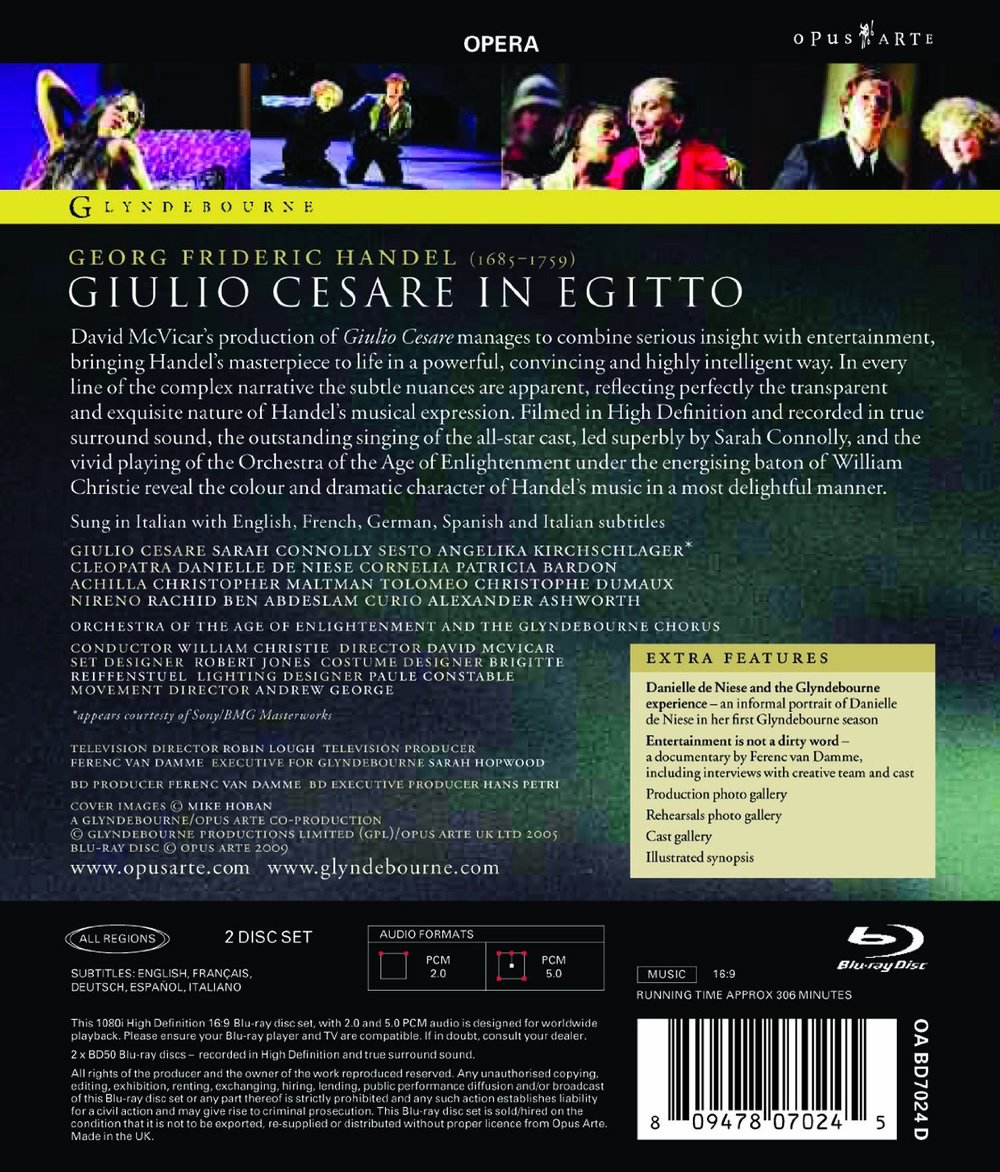

Handel Giulio Cesare (Julius Caesar) opera to libretto by Nicola Francesco Haym. Directed 2005 by David McVicar at Glyndebourne. Stars singers Danielle de Niese (Cleopatra), Sarah Connolly (Giulio Cesare), Patricia Bardon (Cornelia), Angelika Kirchschlager (Sesto), Rachid Ben Abdeslam (Nireno), Christophe Dumaux (Tolomeo), Christopher Maltman (Achilla), Alexander Ashworth (Curio) and Nadja Zwiener (On-Stage Violin). Actors: Sirena Tocco, Irene Hardy, Hatim Kamel, Trevor Goldstein, Benjamin Timothy, and Ted Sikström. William Christie conducts the Orchestra of the Age of Enlightenment (Leader Alison Bury) and the Glyndebourne Chorus (Chorus Master Bernard McDonald). Continuo: harpsichord, Laurence Cummings and Benoìt Hartoin; cello, Jonathan Cohen; viola da gamba, Richard Tunnicliffe; bass, Chi-chi Nwanoku; theorbo, Elizabeth Kenny. Set design by Robert Jones; costumes by Brigitte Reiffenstuel; lighting by Paule Constable; movement direction by Andrew George; fight direction by Nicholas Hall. Directed for TV by Robin Lough. Sung in Italian. The opera runs 3 hours and 46 minutes, and there are valuable extras for a total of 5 hours runtime on 2 discs. Released 2009, discs have 5.0 PCM sound. Grade: A+
Someone defined opera as a musical play about sex and violence. Giulio Cesare satisfies this definition. But how can you get a contemporary audience to relate to Handel with his quaint-sounding music played on old instruments, complicated 3 and 1/2 hour libretto, and multiple parts written to be sung by castrated men? The answer is by jazzing it up with entertaining elements such as sexy singers, women singers acting as men, updated scenery and props, snazzy costumes, and dancing. If you do this with ideas that are logical, in proportion, and in good taste, you will be deemed "entertaining." Then opera lovers can be induced to focus on the wide variety of musical ideas Handel develops in the work. Nobody does this kind of thing better than the folks at Glyndebourne.
It's March 2015. This Giulio Cesare was filmed almost 10 years ago (2005) when the specs for HD TV were still being debated. Opus Arte released it in DVD in 2006.The DVD version was almost universally praised to the point of suspecting payola. 6 years ago Opus Art published this in Blu-ray (2009), when I gave it an A+ grade. I just watched this again and was happy to see how well it has held up. I thought you might appreciate a reminder about this title, which is still among of the best baroque opera titles we have. My screenshots introduce you to the main characters and show how the production team, while respecting Handel's music, succeeded in making this entertaining.
The historical time is 50 BC, when Giulio Cesare (Julius Ceasar) was chasing the forces of rival general Pompey in Egypt. From that point on, everything in the libretto is fiction. Director David McVicar updates 1900 years by replacing togas with tunics (of the English empire). There are 8 singing roles: of these, two are bass roles (General Curio and General Achilla) and all the rest are women or counter-tenors. (Handel used 3 castrati). Below we see Giulio Cesare (Sarah Connolly in trousers), on his arrival in Egypt. Connolly is astonishingly effective and convincing as Cesare. (To see Connally in a female role, see her screenshots in Hippolyte and Aricie.)
Next we meet Pompey's wife Cornelia (Patricia Bardon), and Pompey's young son Sesto (Angelica Kirchschlager in trousers). McVicar brings a lot of humor into his production, but he doesn't slight the serious aspects of Handel's story and music. Cornelia, soon to learn she is a widow, will provide many lamentations throughout the opera. Sesto is a rich character who will grow from a rash child into a hardened killer. In the next shot, a magnanimous Cesare accepts Pompey's peace offer delivered by Cornelia:
General Achilla (Christopher Maltman in white uniform) serves Tolomeo, the King of Egypt and brother of Cleopatra. Achilla is a villian, of course, but Handel gives him a glorious death scene in which he will eventually redeem himself. Here Achilla welcomes Cesare with a special gift:
The freshly severed head of Pompey! Tolomeo hoped in this way to ingratiate himself with Cesare, but this dastardly deed has backfired:
In a simply but beautifully decorated set, Sesto vows he will revenge his father's death. The image you see here and on the cover of the keepcase is the shattered head of Pompey (and not the image of Cesare):
Tolomeo (counter-tenor Christophe Dumaux) is a perpetual bisexual maniac who shows his martial prowess by hacking down defenseless servants. Here he torments his sister Cleopatra (Danielle de Niese) with improper advances, but Cleopatra has an clever answer for his every proposition:
Cesare didn't like the gift, so Tolomo and Achilla plot the death of Cesare next:
Cesare prayerfully honors Pompey's memory in a solemn scene of grand beauty:
Tolomeo failed the please Cesare. Now Cleopatra will try to enlist the Romans in a plot to overthrow brother Tolomeo and become the Queen of Egypt. She presents herself as Lydia, a lady of the court who has been mistreated by Tolomeo:
This sets off about 2 hours of strife over the future of Europe and Asia. But Danielle de Niese would be every man's ultimate phantasy history teacher. The only serious criticism of this production was by some (female I think) purists who deemed Danielle's voice to be less burnished than that of famous recording stars of the past. These critics ignore that those allegedly better voices belonged to women who looked like grandmothers standing in line to buy a pound of butter. Danielle is a different kind of singer with good looks, personality, and acting ability. To describe her impact, you have to come up with examples like Jayne Mansfield and Marilyn Monroe — and we are talking about a lady who debuted at the Met at age 19!
And she can dance! I don't think Danielle would win auditions over professional showgirls, but I bet she was the best student movement director Andrew George ever had:
Now poor Giulio is defeated, but not at a loss for sonorous sentiments:
The dying Achilla has a change of heart and saves the day for the good guys. In this scene we meet Nireno (Rachid Ben Abdeslam) a confident of Cleopatra, who takes the all-important seal in hand:
Rachid is a physical-comedy genius who can steal a grand-opera scene without even opening his mouth. Below he is both funny and profoundly wise as he tries to calm down the raving Sestos, who is overcome by his thirst for bloody revenge on Tolomeo:
Cesare's counter-attack succeeds and Cleopatra will be the sole sovereign:
Because Sestos is dealing with Tolomeo. Sestos is a vet now:
Cornelia is finally safe. But Sestos has a case of PTSD (post traumatic stress disorder):
Cleopatra is crowned as Queen of Egypt:
And all (including the deceased Tolomeo and Achilla) join in the finale:
There are many other wonderful scenes in this work that we haven't touched on. William Christie and the Age of Enlightenment Orchestra provide a vibrant performance that is well-recorded. The screenshots show the brilliance of the sets, costumes, and lighting. But still, pictures can only hint at the the astute and detailed personal directing provided by McVicar for all the singers and actors and the huge contribution to the show by movement coach Andrew George. SQ is excellent with state-of-the-art specs for 2005. My only criticism would be that the PQ is a bit soft by today's standards as you can see by comparing the screenshots above to those from recent Glyndebourne HDVDs such as The Turn of the Screw and Hippolyte and Aricie. In a lesser production, I might reduce the grade to A for PQ. But this show has so much going for it and I'll stick with the grade of A+.
OR





















